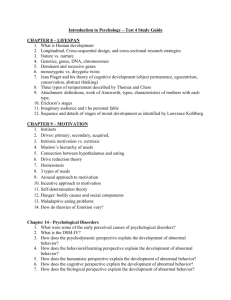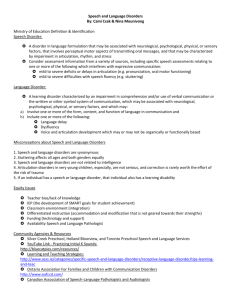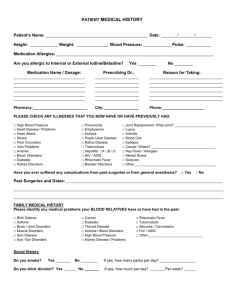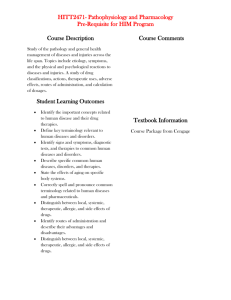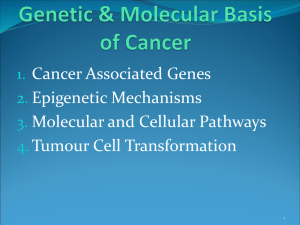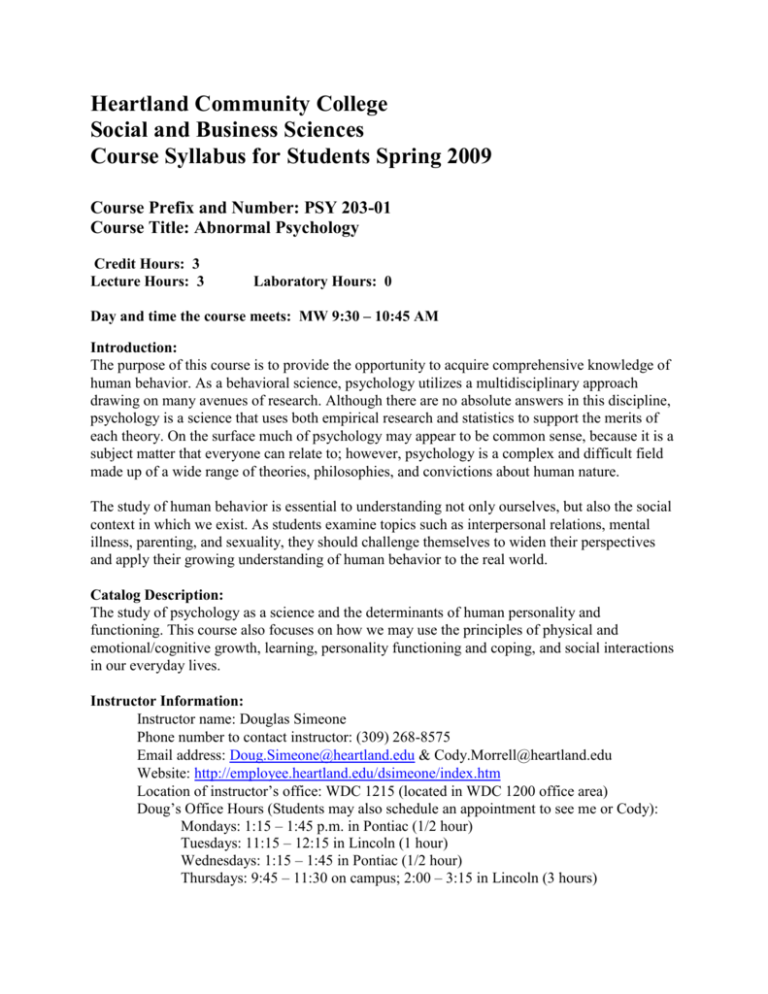
Heartland Community College
Social and Business Sciences
Course Syllabus for Students Spring 2009
Course Prefix and Number: PSY 203-01
Course Title: Abnormal Psychology
Credit Hours: 3
Lecture Hours: 3
Laboratory Hours: 0
Day and time the course meets: MW 9:30 – 10:45 AM
Introduction:
The purpose of this course is to provide the opportunity to acquire comprehensive knowledge of
human behavior. As a behavioral science, psychology utilizes a multidisciplinary approach
drawing on many avenues of research. Although there are no absolute answers in this discipline,
psychology is a science that uses both empirical research and statistics to support the merits of
each theory. On the surface much of psychology may appear to be common sense, because it is a
subject matter that everyone can relate to; however, psychology is a complex and difficult field
made up of a wide range of theories, philosophies, and convictions about human nature.
The study of human behavior is essential to understanding not only ourselves, but also the social
context in which we exist. As students examine topics such as interpersonal relations, mental
illness, parenting, and sexuality, they should challenge themselves to widen their perspectives
and apply their growing understanding of human behavior to the real world.
Catalog Description:
The study of psychology as a science and the determinants of human personality and
functioning. This course also focuses on how we may use the principles of physical and
emotional/cognitive growth, learning, personality functioning and coping, and social interactions
in our everyday lives.
Instructor Information:
Instructor name: Douglas Simeone
Phone number to contact instructor: (309) 268-8575
Email address: Doug.Simeone@heartland.edu & Cody.Morrell@heartland.edu
Website: http://employee.heartland.edu/dsimeone/index.htm
Location of instructor’s office: WDC 1215 (located in WDC 1200 office area)
Doug’s Office Hours (Students may also schedule an appointment to see me or Cody):
Mondays: 1:15 – 1:45 p.m. in Pontiac (1/2 hour)
Tuesdays: 11:15 – 12:15 in Lincoln (1 hour)
Wednesdays: 1:15 – 1:45 in Pontiac (1/2 hour)
Thursdays: 9:45 – 11:30 on campus; 2:00 – 3:15 in Lincoln (3 hours)
Textbook:
Required:
Nevid, Rathus & Greene. (2008) Abnormal Psychology in a Changing
World. 7th Ed. Upper Saddle River, NJ. Pearson Prentice Hall.
Relationship to Academic Development Programs and Transfer:
This course fulfills 3 of the 9 semester hours of credit in Social Sciences required for the A.A. or
A.S. degree. This course should transfer as part of the General Education Core Curriculum
described in the Illinois Articulation Initiative to other Illinois colleges and universities
participating in the IAI. However, students should consult an academic advisor for transfer
information regarding particular institutions. Refer to the IAI web page at www.itransfer.org for
more information.
Course Objectives (Learning Outcomes):
At the completion of this course, the student will be able to accomplish the following objectives:
1.
2.
3.
4.
5.
6.
7.
8.
9.
10.
11.
12.
13.
14.
15.
16.
Misconceptions of abnormal behavior popularly held.
Major scientific methodologies involved in researching abnormal behavior.
Historical context for attitudes and beliefs concerning abnormal behavior.
Knowledge of basic tenets of biological, psychosocial and sociocultural
viewpoints of behavior.
The role of stress in maladaptive behavior categories of stressors and coping
strategies.
Knowledge of anxiety based disorders as viewed from the psychodynamic,
learning, cognitive and biological perspectives.
Understanding of the relationship between psychological and biological factors
in illness.
Recognition of personality disorders, which are socially maladaptive.
Awareness of affective disorders and conditions influencing mood.
Information regarding schizophrenic disorders.
Substance abuse and other addictive disorders.
Symptoms and problems associated with organic brain disorders and mental
retardation.
Review of psychological disturbances of childhood and adolescence.
The clinical assessment and techniques used to determine the nature and severity
of maladaptive behavior.
Therapies utilized in the treatment of mental disorder.
An understanding of social measures for the prevention and amelioration of
psychological disorders.
-
-
Course/Lab Outline:
The following is a very brief outline of the most basic topics every instructor teaching the course
will include. There will of course be additional topics; each instructor may vary in these topics,
as well as how much time is spent on each topic.
1. Introduction and Methods of Research
a. Defining Abnormal Behavior
b. Historical Views of Abnormal Behavior
c. Research Methods in Abnormal Psychology
2. Contemporary Theoretical Perspectives
a. Psychodynamic Perspectives
b. Cognitive Perspectives
c. Humanistic and Sociocultural Perspectives
d. Biological Perspectives
3. Classification and Assessment of Abnormal Behavior
a. DSM
b. Assessment Testing
c. Reliability and Validity
4. Therapy and Treatment
a. Psychodynamic Therapies
b. Humanistic Therapies
c. Cognitive Therapies
d. Behavioral Therapies
e. Biological Therapies
d. Group and Family Therapies
5. Stress and Coping
a. Stress and Health
b. Biological and Psychological Factors
6. Anxiety disorders
a. Panic Disorder
b. Generalized Anxiety Disorder
c. Phobias
7. Dissociative and Somatoform disorders
a. Dissociative Amnesia
b. Dissociative Fugue
c. Depersonalization Disorder
d. Dissociative Identity Disorder
e. Conversion Disorder
f. Somatoform Disorders
8. Mood disorders and Suicide
a. Major Depressive Disorder
b. Bipolar Disorder
c. Suicide
9. Personality disorders
a. Antisocial Personality Disorder
b. Schizoid and Schizotypal Personality Disorders
c. Histrionic and Narcissistic Personality Disorders
10. Substance-related disorders
a. Abuse and Dependence
b. Alcoholism
c. Other Drug Addictions
11. Eating Disorders, Obesity, and Sleep Disorders
a. Anorexia and Bulimia Nervosa
b. Causes of Obesity
c. Dyssomnias and Parasomnias
12. Sexual and Gender Identity disorders
a. Gender Identity Disorder
b. Paraphilias
13. Schizophrenic and Psychotic disorders
a. Schizophrenia
b. Other Forms of Psychosis
14. Abnormal Behavior in Childhood and Adolescence
a. Risk Factors
b. Attention Deficit Disorder
c. Conduct Disorder
d. Mental Retardation
15. Cognitive Disorders
a. Alzheimer’s Disease
b. Other Medical Conditions
16. Violence and Abuse
a. Rape
b. Child Abuse
17. Contemporary and Legal Issues
a. Patient’s Rights
b. The Insanity Defense
c. Predicting and Preventing Psychological Disorders
Methods of Instruction:
Instructional methods for this course may include lecture, small group activities and the use
of videos.
Course Policies:
Method of Evaluation (Research Paper/Project/Exams/Final Exam):
Guidelines for the research papers and project are posted on the class web page, and can
be found at:
http://employee.heartland.edu/dsimeone/Psy 203/psy203mainpage.htm
Research Papers: Each student is required to write two 3-page papers, one on the topic of
Sanism and one on Psychopharmacology. Additional information about the paper will be
discussed during the first week of class. Papers not turned in by the due date/time will
not be accepted, resulting in a score of zero for the assignment. Each paper is worth 50
points.
Total Points = 100
Project:
Story Project: Students are required to write a 5 - 6 page “story” revolving around a number
of characters, each of who have been diagnosed with different psychological disorders.
Additional information about this option will be discussed during the first week of class.
Papers not turned in by the due date/time will not be accepted, resulting in a score of
zero for the assignment.
Total Possible Points for Project Options = 100
Exams: Students will be given 3 exams during the course of the semester. Students will be
tested on material taken from the lectures as well as material from the text that I have not
lectured on. Each exam will be worth 50 points.
Total Points = 150
Make-up Exam Policy: Students missing class on an exam day must send an e-mail to
BOTH instructors before class begins to let us know why they won’t be in class. Prior
to making up the exam students must provide appropriate written documentation (e.g.,
doctor’s note) as to why the exam was missed. Students not following these guidelines
will not be permitted to make up the exam and will receive a score of zero. The make-up
exam will consist of 7 essay questions, of which the student will have to respond to the 5 of
his/her choice. The exam must be made up within 1 week of when the in-class exam was
administered. Students who have not taken the make-up exam within the one week time
frame will receive a score of zero on the exam. Students who know ahead of time that they
won’t be in class for a scheduled exam can take the exam early, but must give me at least 2
days notice prior to taking the exam. Students will be given at least 1 week’s notice as to
when an exam will be administered. Students can only make up one exam. Students
missing more than one exam will receive a score of zero on each additional exam missed.
Final Exam: There will be a comprehensive final exam worth 200 points. Missed final
exams cannot be made up, but they can be taken early if there is a valid reason for
doing so.
Total Possible Points = 200
Final Grade Determination: Students can earn up to 550 points in this class. The 2
research papers are each worth 50 points, totaling 100 points. The project is worth 100
points. There are 3 exams, each worth up to 50 points, totaling 150 points. The final exam is
worth up to 200 points. Final grades will be determined as follows:
495 - 550 points earned = A (90-100%)
440 - 494 points earned = B (80-89%)
385 - 439 points earned = C (70-79%)
330 - 384 points earned = D (60-69%)
329 points earned and below = F (59% or lower)
Participation and Attendance:
It is expected that students will participate in each class in a meaningful way. My expectation is
that students will voluntarily respond to questions posed. Most students may not know the
answers too many of the questions posed during class. I do, however, expect students to think
critically about what has been asked, and to then make an attempt to respond to it. Remember,
the only days in class you need to know all the answers are the exam days.
Attendance will be taken every class. Students missing more than 8 classes will receive a
grade of F for the semester.
Incompletes: Policy as written in Heartland Community College’s catalogue.
Extra Credit: This instructor doesn’t give extra credit assignments, as he does not believe in
inflating grades.
Make-up of tests and assignments: See above.
Deadlines: Any and all assignments must be turned in by the due date/time. Late
assignments will not be accepted, resulting in a score of zero.
Required Writing and Reading:
Every instructor will require a minimum of 10 pages of writing from each student. This may
be accomplished through a combination of various writing requirements such as: term
papers, essay questions on exams, journals, or other written assignments.
Academic Integrity and Plagiarism
Academic Integrity
Academic integrity is a fundamental principle of collegial life at Heartland Community College
and is essential to the credibility of the College’s educational programs. Moreover, because
grading may be competitive, students who misrepresent their academic work violate the right of
their fellow students. The College, therefore, views any act of academic dishonest as a serious
offense requiring disciplinary measures, including course failure, suspension, and even expulsion
from the College. In addition, an act of academic dishonesty may have unforeseen effects far
beyond any officially imposed penalties.
Violations of academic integrity include, but are not limited to cheating, aiding or suborning
cheating or other acts of academic dishonesty, plagiarism, misrepresentation of data, falsification
of academic records or documents and unauthorized access to computerized academic or
administrative records or systems. Definitions of these violations may be found in the college
catalog.
Plagiarism
Plagiarism is the presenting of others= ideas as if they were your own. When you write a paper,
create a project, do a presentation or create anything original, it is assumed that all the work,
except for that which is attributed to another author or creator, is your own. Plagiarism is
considered a serious academic offense and may take the following forms:
1
Copying word-for-word from another source and not giving that source credit.
2
3
4
5
6
Paraphrasing the work of another and not giving that source credit.
Adopting a particularly apt phrase as your own
Using an image or a copy of an image without crediting its source
Paraphrasing someone else=s line of thinking in the development of a topic as if
it were your own.
Receiving excessive help from a friend or elsewhere, or using another project as
if it were your own.
Note that word-for-word copying is not the only form of plagiarism.
The penalties for plagiarism may be severe, ranging from failure -on the particular piece of work,
failure in the course or expulsion from school in extreme cases.
[Adapted from the Modem Language Association’s MLA Handbook for Writers of Research Papers.
New York: MLA, 1995: 26]
Support Services:
Open Computing Lab www.hcc.cc.il.us/asc/computerlab.html
The Open Computing Lab provides free computing for HCC students at convenient times
throughout the week. The computer lab is staffed by trained Lab Assistants and offers the use of
approximately 70 computers, a scanner, a laser printer, and an electric typewriter.
Notice of Canceled Class Sessions
Cancelled class sessions, for all HCC classes, will be listed under Cancelled Class Meetings in
the A-Z Index and under Academic Information in the Current Students page on the HCC Web
site. Go to http://www.heartland.edu/classCancellations/ to learn what classes have been
cancelled for that day and the upcoming week. Be sure to check the last column, which might
contain a message from the instructor.
Syllabi disclaimer:
It is possible that changes will occur in regard to the material covered during the course of the
semester. Changes will not be made in regard to the written project, the number of tests given,
or the point totals of the written project, semester exams or the final exam. Changes will not be
made in how the student’s final grade is determined.
Course Calendar:
PowerPoint Presentation
Introduction and Methods of Research
Contemporary Perspectives on Abnormal Behavior
Classification and Assessment of Abnormal Behavior
Methods of Treatment
Exam 1
Stress, Psychological Factors and Health
Anxiety Disorders
Dissociative and Somatoform Disorders
Exam 2
Mood Disorders and Suicide
Text Reading
Chapter 1
Chapter 2
Chapter 3
Chapter 4
Chapter 5
Chapter 6
Chapters 7
Chapter 8
Eating Disorders, Obesity and Sleep Disorders
Disorders Involving Gender and Sexuality
Exam 3
Schizophrenia and Other Psychotic Disorders
Personality Disorders
Abnormal Behavior in Childhood and Adolescence
Cognitive Disorders and Disorders Related to Aging
Abnormal Psychology and the Law
Substance Abuse and Dependence
DATES OF NOTE:
Sept. 7th (Mon.)
Nov. 4th (Wed.)
Nov. 25-27
Dec. 7th (Mon.)
Chapters 10
Chapter 11
Chapter 12
Chapter 13
Chapter 14
Chapter 15
Chapter 16
Chapter 9
LABOR DAY – NO CLASSES
LAST DAY TO WITHDRAW FROM 16-WEEK CLASSES
THANKSGIVING HOLIDAY
FINAL EXAM (8:00 – 9:50 a.m.)
Due dates for the research papers and projects will be included with the handouts/online postings
that detail the requirements for each assignment. Exams dates will be announced in class and
also posted online.
Adapted by the Curriculum and Academic Standards Committee June 1998
Adapted 6/98

